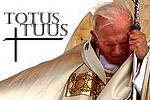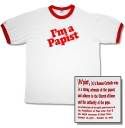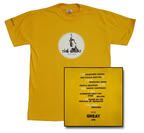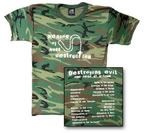Little White Caskets: A Lesson in Love
I found myself in a graveyard this week about an hour and a half outside the city. Carefully observing gravestone after gravestone, I took a moment to thank God for the life of each person buried there. As I walked and read the names, subtracting one year from another to figure the age they lived to be, I wondered what each was like. I wondered about their smile and their laugh. I wondered if they enjoyed music or nature or church. Some had "beloved daughter/son" or "mother/father". It was sweet to see the care taken of the majority of the graves. There was even a grave there with a poem in the headstone. It spoke of the beloved dead's smile and her sweet laugh. It spoke of her charming personality lighting up the small town where she lived and died. She sounded like a very sweet young girl, dead at thirty-two. I remember walking carefully along the paths between graves and noticing how many servicemen were laid to rest there. Vietnam. Korea. Both world wars. "Thank you," I would whisper as I ended my prayer. "Thank you for the gift of your life." As I finished my thoughts at one marker I noticed a small stone in the ground where I thought I might take my next step. There I read only a name and two dates. There was no special message describing service or smiles. Only a plain-font stone rested there and below it lied the body of a child, lost the day of his birth. I remember taking a small step back, the image of a little white casket frozen in my mind. "Sweet baby! You were loved." I knew that love - the love of someone so small, so innocent, so unprepared for what was to come, not that anyone was or could be.
It was December 1, 1997, that Joseph Adam was born into the Hughey family. A light six pounds, five ounces, blue and purple all over but with a healthy scream. I was at school that day, as I had been when my sister was born only a year before, and received the news over the intercom system in my fifth grade classroom. Lots of pride, lots of joy, lots of excitement that morning. The afternoon, though, would bring heartache and anxiety.
Later, when I saw my dad, his eyes brimming with tears, I knew something was terribly wrong. He pulled a handful of small Polaroids from his jacket pocket, smiling through the tears, proudly showing off my new brother and Mom who had been so brave that morning. This time my friends weren't allowed to see them. Only I stood looking at them with Dad before we rushed to the car. We were both quiet on the drive to the hospital. "He probably won't make it to see his first birthday." He couldn't tell me anymore and I couldn't ask. I sat there, staring ahead, tears filling my ten-year-old eyes. For the first time in my life I was experiencing death and hurting because I loved the life death was claiming, even so new, so unknown, so inexperienced.
Joseph was a fighter from day one. He moved from the NICU into the nursery in less than a week and was home within two weeks after that. For that first year of his life he was in and out of Children's Hospital enduring test after test and surgery after surgery. The doctors didn't know what was wrong. No answers, only questions. Except for one question: "How is this kid still alive?" They asked it right up to his first birthday. And on his first birthday, we celebrated. We laughed a lot and we cried a lot. We did the same on his second. Each year Joseph taught us something new about living in love. To love Joseph was to know pain. To be attached to him was to know heartache. He was going to die.
Joseph was prodded and poked more than I would have been able to stand and still he laughed... a lot. He only rarely cried and hardly ever whined. He brought joy to lives that did not know joy while he himself suffered greatly. No matter his condition, Joseph loved with his whole self in the best - and sometimes, only - way he knew how. Even confined to a hospital bed he hugged and cuddled. He blew kisses despite the limited movement of his hands and arms which were strapped with tubes and needles and patches. With Joseph in my life, my daily thoughts were plagued by conscious thoughts of death - of his death - and still it was richer, more fulfilling, more worthwhile than ever it had been. I hadn't lived long but I knew, even then, that Joseph had changed me and would continue to change me forever.
Joseph had a feeding tube that pierced his tender, sickly little body and most people stared. His head was a little larger than normal and he was emaciated looking. To strangers, especially adults, looking at Joseph was frightening. But to those who knew him, looking at him was to look at Love. Looking at Joseph, I'm sure some people wondered why Mom didn't abort him when she first found out. Truth be told, she didn't want any more children. But she knew the value of life and happily prepared a space for him in her heart and in our home. She was told shortly after his birth that he would not live to one but she didn't give up on him. At one, she was told he would not live to two. At two he would not live to five. Now we dare to hope to see his eighteenth birthday.
Standing there in the graveyard ten years after my brother's birth, again thanking God for the gift of life, I remembered all of the little white caskets I've known - caskets which held children not as "lucky" as Joseph but who still possessed a great purpose, a great lesson to teach. How greatly those caskets - like Joseph's life - have changed each of our lives. Each casket represents a person who didn't move in next door, someone who didn't bake a winning pie for the local fair, someone who didn't partake in the sign of peace at Mass on Sunday. Each white casket is someone we have loved and lost. And lives we have loved and lost, if we let them, change us for the better.
So today I wonder this: if we gave a casket to every child not allowed even that one hour of life, how many little white caskets would we have buried by now? How many lives have been loved, if only by God, and lost due not to natural causes or freak accidents but to a lack of care or concern by those closest to them? How many caskets would we fill with the bodies of our brethren who were not given the chance to change our lives - in one hour, one day, one year?
Labels: Pro-Life Issues, Projects, School













